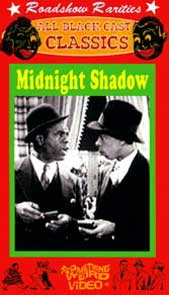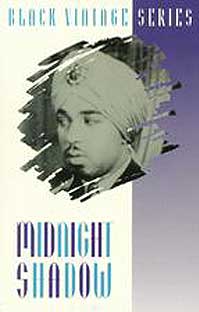A lethargically paced short feature fascinating more for its historical significance than its story, Midnight Shadow (1939) is more competently done than a lot of independent black productions of the era. Set in an all-black region of Oklahoma, one of the obvious points of the film is to show American negros fulfilling every societal role.
 The producer & director George Randol (who played the High Priest in the classic Green Pastures, 1936) started his own production company to meet the needs of black neighborhood cinemas. Unfortunately the several black independent film studios that arose in the 1930s were put out of business as soon as Hollywood realized there was money to be made with black-cast films distributed mainly to black neighborhood theaters. The producer & director George Randol (who played the High Priest in the classic Green Pastures, 1936) started his own production company to meet the needs of black neighborhood cinemas. Unfortunately the several black independent film studios that arose in the 1930s were put out of business as soon as Hollywood realized there was money to be made with black-cast films distributed mainly to black neighborhood theaters.
The money for this & other all-black features was fronted by Sack Amusement, a Texas-based film backer & theater chain that catered to black communities in the South & Southwest, besides some major inner city neighborhoods elsewhere in America. It was established by Alfred N. Sack during the silent film era (in 1920) & specialized in black shorts & features from about 1937 to 1945.
A beautiful young woman (Frances Redd, a beauty, but not the film's best actor) is courted by a Moslem mentalist, Prince Alihabab (John Laurence Criner). Frances was the wife of Adrian Pepe of the Platters, & she was the sister of the exotica jazz performer Korla Pandit, who a few years later adapted Criner's costume in this film to his exotica act.
The turbaned Alihabab seems a bit sinister & when Margaret's father (Clinton Rosemond) reveals to Alihabab that his daughter will be inheriting a valuable piece of oil land in Texas, it doesn't seem such a wise choice to show the faux prince even where the deed & map are hidden.
Margaret's previous boyfriend Buster (Edward Brandon, a good though obscure actor who doesn't get nearly enough screen time) doesn't trust Alihabab. And being much the handsomest fellow in the show, obviously Buster is the more appropriate sweetheart for a Christian girl like Margaret.
The script plays on the viewers' mistrust & expectation that a mystic in a turban who worships Allah instead of Jehovah has got to turn out to be a bad-ass bastard. But in fact he's not all that bad, even if Buster is the guy Margaret ends up with. If the Moslem is less suited to her it's more because he's a playboy trying to get her to go on the road with his act, whereas she's the marrying & homespun type.
When Margaret's dad is murdered by a cat burglar (Charles Hawkins) & the deed & map are stolen, suspicion falls wrongly on the Moslem. Comic relief Junior Lingley & his sidekick Lightfoot (Richard Bates & Buck Woods) are the sort of bumbling black guys often encountered as similar comic relief Hollywood films, Junior having taken a mail order course on being a private eye & getting dressed up like Sherlock Holmes.
But unlike the regular Hollywood version of the comic relief negro, Junior actually does work things out fairly intelligently, & captures the killer before the police sargeant (Jess Lee Brooks) cracks the case.
The story manages to convey the loving nature of black family life; offers a somewhat tepid clarion for tolerance among good Christians in not assuming black Moslems are inevitably up to no good; & in general helps redress a lot of what was lacking for black cinema-goers of the day.
Some of the acting is quite nice; I especially liked Ollie Ann Robinson as Margaret's mother, & am a little surprised that this appears to be her only film role, as is true of about half the cast. The other half can be seen in rather demeaning roles for Hollywood (big Jess Lee Brooks for instance did several jungle savage characters, not always with a screen credit), so the all-black-cast "race films" which peaked in the 1930s provided the best roles for character actors who might otherwise never have been seen playing more than maids & porters.
As another side-note, Midnight Shadow lacks any night club jazz sequence, though such were de rigour for "race films." I have to assume, light though the film is, that the screenwriter-director consciously wanted the story to stand on its own, & left out the usual musical sequence on purpose.
copyright © by Paghat the Ratgirl
|

 The producer & director George Randol (who played the High Priest in the classic Green Pastures, 1936) started his own production company to meet the needs of black neighborhood cinemas. Unfortunately the several black independent film studios that arose in the 1930s were put out of business as soon as Hollywood realized there was money to be made with black-cast films distributed mainly to black neighborhood theaters.
The producer & director George Randol (who played the High Priest in the classic Green Pastures, 1936) started his own production company to meet the needs of black neighborhood cinemas. Unfortunately the several black independent film studios that arose in the 1930s were put out of business as soon as Hollywood realized there was money to be made with black-cast films distributed mainly to black neighborhood theaters.